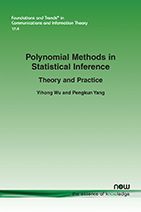Polynomial Methods in Statistical Inference: Theory and Practice
By Yihong Wu, Department of Statistics and Data Science, Yale University, USA, yihong.wu@yale.edu | Pengkun Yang, Department of Electrical Engineering, Princeton University, USA, pengkuny@princeton.edu
Abstract
This survey provides an exposition of a suite of techniques based on the theory of polynomials, collectively referred to as polynomial methods, which have recently been applied to address several challenging problems in statistical inference successfully. Topics including polynomial approximation, polynomial interpolation and majorization, moment space and positive polynomials, orthogonal polynomials and Gaussian quadrature are discussed, with their major probabilistic and statistical applications in property estimation on large domains and learning mixture models. These techniques provide useful tools not only for the design of highly practical algorithms with provable optimality, but also for establishing the fundamental limits of the inference problems through the method of moment matching. The effectiveness of the polynomial method is demonstrated in concrete problems such as entropy and support size estimation, distinct elements problem, and learning Gaussian mixture models.
Polynomial Methods in Statistical Inference: Theory and Practice
The authors of this monograph survey a suite of techniques based on the theory of polynomials, collectively referred to as polynomial methods. These techniques provide useful tools not only for the design of highly practical algorithms with provable optimality, but also for establishing the fundamental limits of inference problems through moment matching. The authors demonstrate the effectiveness of the polynomial method using concrete problems such as entropy and support size estimation, distinct elements problem, and learning Gaussian mixture models.
This monograph provides a comprehensive, yet concise, overview of the theory covering topics such as polynomial approximation, polynomial interpolation and majorization, moment space and positive polynomials, orthogonal polynomials and Gaussian quadrature. The authors proceed to show the applications of the theory in statistical inference.
Polynomial Methods in Statistical Inference provides students, and researchers with an accessible and complete treatment of a subject that has recently been used to solve many challenging problems in statistical inference.
